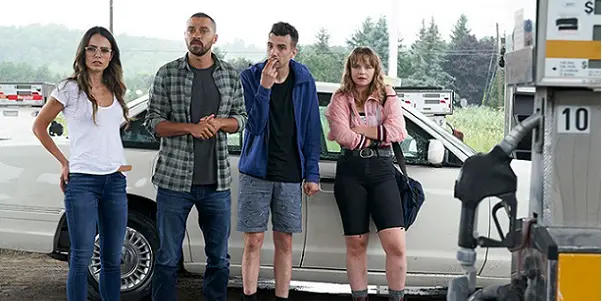To be perfectly honest, if you’d told me a week ago that the most challenging and discomforting film I’d see at Fantastic Fest was directed by Jay Baruchel, I would’ve had a hard time believing you. I don’t mean this as any kind of jab against the actor-turned-director.
Being most well-known for Judd Apatow comedies and for lending his voice to the How to Train Your Dragon franchise, his work so far hasn’t exactly screamed confrontational genre deconstruction. And yet, the restraint and nuance he shows, both as director and actor, in Random Acts of Violence, provides an exciting window into a potential new stage in this artist’s career.
A Horrific Anti-Horror
It is by no means an exaggeration to say that Random Acts of Violence is one of the most difficult films I’ve seen this year. This has less to do with its intense violence, and it is intense, as much as it does with the narrative and thematic framing of that violence.

Without giving too much away, the film follows Todd (Jesse Williams in his element), the author of an extremely popular, and gruesome, horror comic-book series called Slasherman, which graphically depicts the murders of a character based off of an unsolved string of horrific murders that Todd had heard about growing up. Todd’s wife, Kathy (Jordana Brewster in one of her best roles), is also an author interested in the so-called I-90 killings, but chooses to focus on the victims rather than the killer.
The film kicks off when Todd and Kathy decide to embark on a road trip with Todd’s publisher and close friend, Ezra (Jay Baruchel) as well as his assistant, Aurora (Niamh Wilson). Kathy needs to interview people for her book and Todd needs inspiration for the last issue of Slasherman, so their trip across I-90 becomes the stone with which they hit their prospective birds. Everything seems to be going fine, until a series of horrific events start following the group, each seeming more and more like one of the nightmarish scenarios Todd drew up for Slasherman.
Towards the third act of the film, it becomes unequivocally clear that Random Acts of Violence is a firm polemic against the careless ways with which male authors employ violence, specifically against women, in their stories. Whether or not that fully works is a question that I can’t answer today. It is, after all, a violent male-directed film about the problems with violence in male-authored stories. Todd is chastised for the sheer number of women who die terribly in his work, but women also die in this film, and none of them go gentle into that good night.
Violence Between Purpose & Entertainment
As conflicted as I still am about Baruchel’s own use of violence, it is here that we must draw a sharp line between Random Acts of Violence and the likes of last year’s The House that Jack Built. Lars von Trier brand of “provocation” is, more often than not, an adolescent obsession with controversy over craft. While the film, of course, never condoned any of Jack’s actions, it also completely failed to wrestle with any of the implications of depicting such revolting violence on women’s bodies in such sheer detail.
Baruchel, on the other hand, consistently proves that he is, at the very least, critically purposeful with the violence in his film, and particularly when it is gendered. Again, it is by no means perfect, and I by no means feel comfortable nor confident enough to write off that paradox which is central to Random Acts of Violence. But I can tell you right now that it is, perhaps, the most challenged I have ever been in a film that is critical of visual violence. None of the violent scenes exhume any sense of coolness or thrills. They are awful, upsetting scenes.
These scenes’ nastiness has less to do with how graphic they are (The House that Jack Built is far more graphic, for example), but everything to do with the conversation they form with every scene in which Todd is forced to confront the toxic impact of his work.
By sparing no subtlety in commenting on the inherently exploitative and misogynistic nature of Slasherman, Baruchel and Jesse Chabot’s script forces the viewer, and especially the horror-seasoned, to confront their own enjoyment at watching others’ pain, even if it’s entirely fictional. Though these kinds of moments, where Todd is being blasted by radio hosts, cops, and his own wife, might seem didactic elsewhere, they fit perfectly here.
Random Acts of Violence: Conclusion
But Baruchel doesn’t claim to have any answers, and this is a good thing. The conversation around violence in media is as multi-layered as it is timely. On the one hand, we must make sure that we never steer into rightwing talking points that deviously shift the blame on societal violence from much larger structures of power such as white supremacy and misogyny, onto the media.
But on the other, we can no longer give irresponsible (male) writers and artists a pass in the name of edginess when their work, regardless of their intentions, lionizes the darkest elements of our society. With Todd Phillips’s already controversial Joker just around the corner, Random Acts of Violence could not have arrived at a more critical time.
Does content like this matter to you?
Become a Member and support film journalism. Unlock access to all of Film Inquiry`s great articles. Join a community of like-minded readers who are passionate about cinema - get access to our private members Network, give back to independent filmmakers, and more.